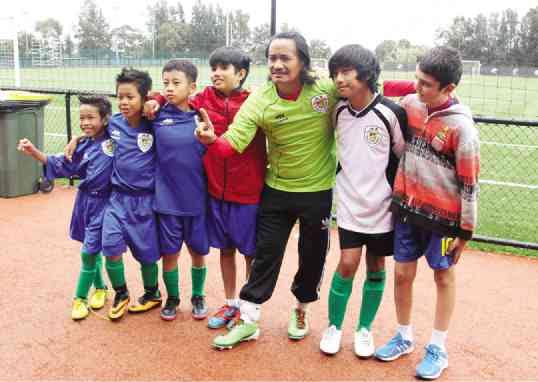Elmer Bedia left his heart in the Philippines. When the country’s most-feared striker migrated to Brisbane, Australia, four months after the People Power revolt in February 1986, he left behind a national football team that was slowly climbing back from the depths of international football—pre-Azkals.
Born in the football hotbed of Barotac Nuevo, Iloilo, in 1962, Bedia—“Lacknet” to friends—was the biggest name in the Philippine Air Force squad coached by Col. Lope Q. Pascual that won several National Football League and other titles in the 1980s. He played alongside Mariano “Nonong” Araneta, now president of the Philippine Football Federation; Ronnel Cajelo, Rodolfo Alicante and Edgar Berja.
Still 24 when he left to play professionally in Brisbane, he came back to don the national colors anew in the 1991 Manila Southeast Asian Games, making the crucial assist to strike partner Norman Fegidero for the goal that lifted the underdog PH team past powerhouse Malaysia, 1-0, before a roaring crowd of 25,000 at Rizal Memorial Stadium.
“That was my most memorable moment with the national team,” says the frizzy-haired Bedia, who now coaches the junior team of Brisbane’s Olympic United FC, where two of his six children, Luck and Elmer Jr., played when they were teenagers. “Nothing’s more satisfying than helping your country win before thousands of your compatriots.”
That RMS crowd in 1991 was easily the biggest to see a football match involving a PH team in decades—several thousands more than the number of fans that now come to see the Azkals play games at the ancient stadium.
A stalwart of the Brisbane squad for nine years, Bedia considers himself the “first Azkal” to don the PH uniform. He says there’s nothing wrong with allowing overseas-based players with Filipino roots to play for the national team.
“I have no problem with the [Azkals] program,” he says. “Anyone with Filipino blood, wherever he comes from, should be given a chance to play for the country and help improve the level of football in the Philippines.”
Although he already played nationally in junior tournaments at age 11, Bedia’s star began to rise when he was barely 17. In 1979 he powered Barotac Nuevo to the Andres Soriano Football Cup, the country’s national championship, at the expense of San Miguel Corp., a squad powered by several national players and mentored by national coach Juan Cutillas.
“Colonel Pascual was there and immediately signed me up for the PAF squad, which also had many players from Barotac,” says Bedia, who won Mr. Football honors from the Philippine Sportswriters Association several times.
Happy that the Philippines has risen to the No. 1 ranking in Southeast Asia, the humurous Bedia regularly comes back home to watch the Azkals play, donning tri-color wigs and caped with the national flag.
During his trips here, he helps promote the sport by giving free clinics in his hometown and assisting former national teammate Rudy del Rosario hold the local tournament of the Homeless World Cup for kids. Three years ago, Bedia launched the Elmer Lacknet Bedia Football Academy in his Iloilo hometown.
“It’s most satisfying to give something back to the sport that gave me a source of livelihood,” says Bedia, now 55. “I have a passion for helping kids learn and increase proficiency in the game. I believe it’s my calling. And that’s my way of saying ‘thank you’ to football.” —Ted S. Melendres
